Often referred to by the term of systems inquiry, review of systems is a methodology employed by healthcare providers. With the help of review of systems, healthcare providers are able to extract crucial details regarding the medical history of a patient.
A review of systems extracts a patient’s medical history by the means of a series of questions. With the help of such questions, physicians attempt to identify signs or symbols that the patient may have experienced in the past. A lot of times, the review of systems allows healthcare providers to equate the patient’s medical history along with their present ailments to efficient engineer the mode of treatment.
Contents
Review of Systems: Overview
The review of systems is designed with the help of a series of questions which are arranged by an organ system. Using such a design, the physicians are able to uncover the diseases which might have plagued the person in the past. A few ways in which physicians apply the review of systems are:
- The first type of physicians uses the review of systems as a screening tool. In such situations, the healthcare provider uses the tool on each and every patient who pays a visit to the healthcare provider.
- The second type of physician uses the review of systems only on those patients who contract a particular category of risk.
- The third category of physicians doesn’t actually use the review of systems until it can be used to better define the causes of a particular presenting symptom.
The Benefits
There are various benefits which arise when healthcare providers apply a review of systems in their day-to-day applications. A few such advantages include:
- The questions asked via the review of systems are referenced from a wide range of common and important clinical conditions.
- A lot of disorders and diseases would perhaps go unseen if they were not specifically checked by the patient’s prompts.
- The identification of a patient’s conditions with the help of a review of systems has a positive impact on the person’s health, improving their mortality rates.
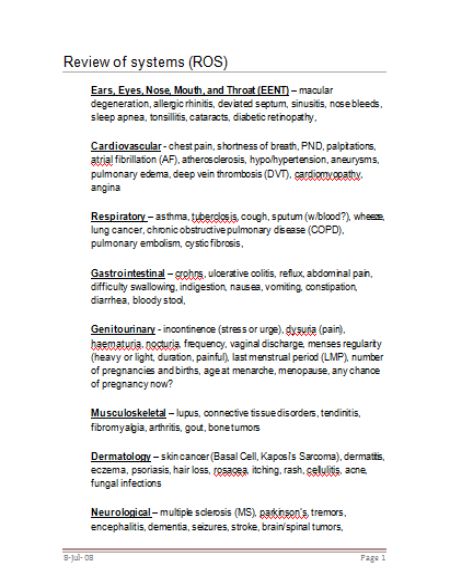
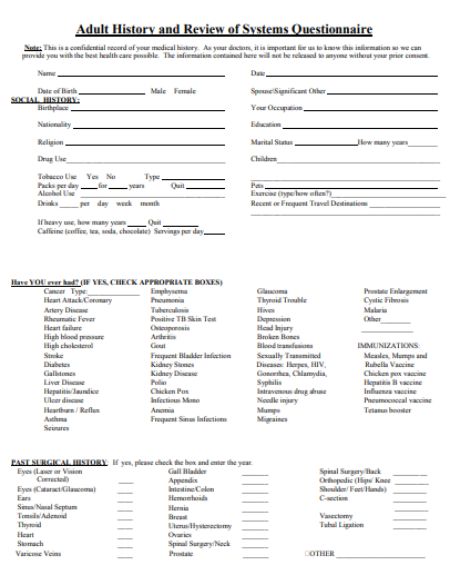
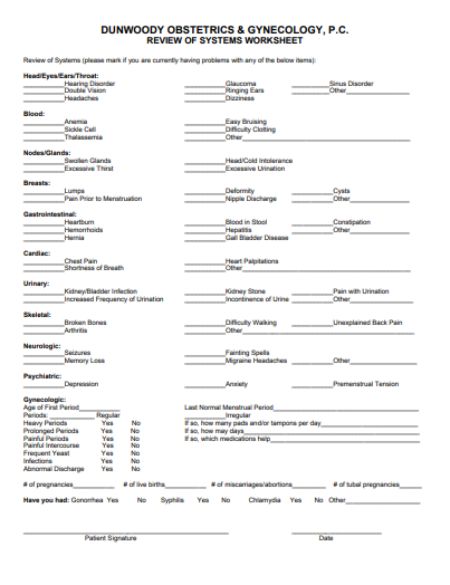
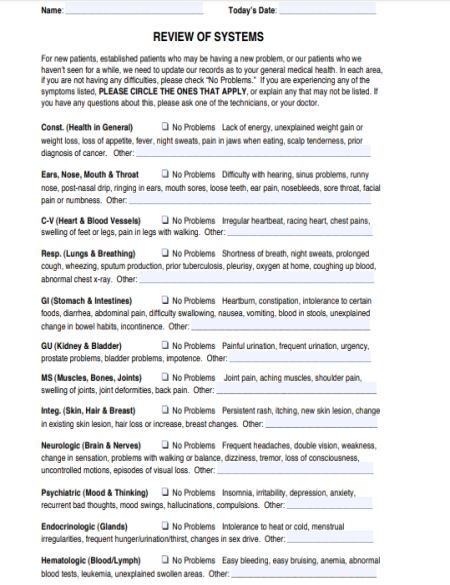
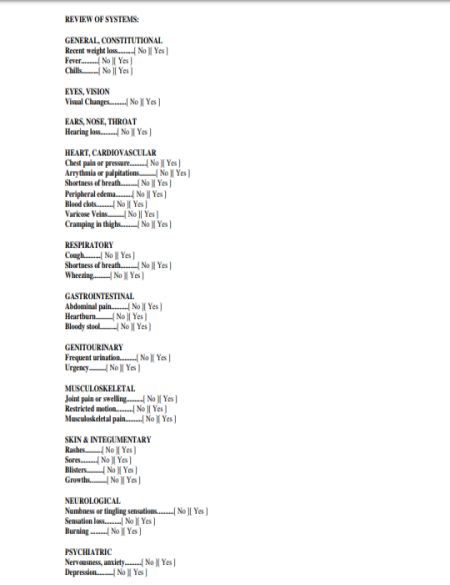
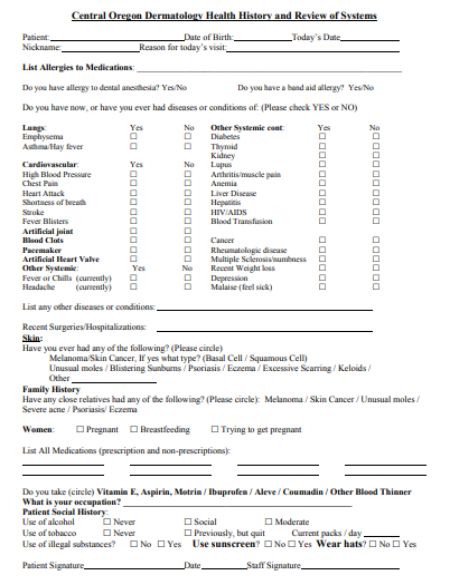
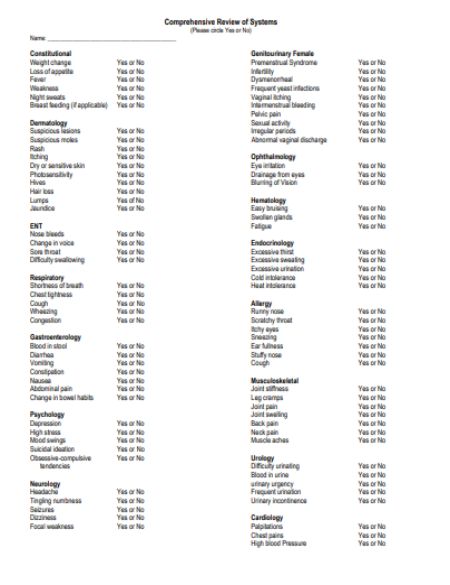
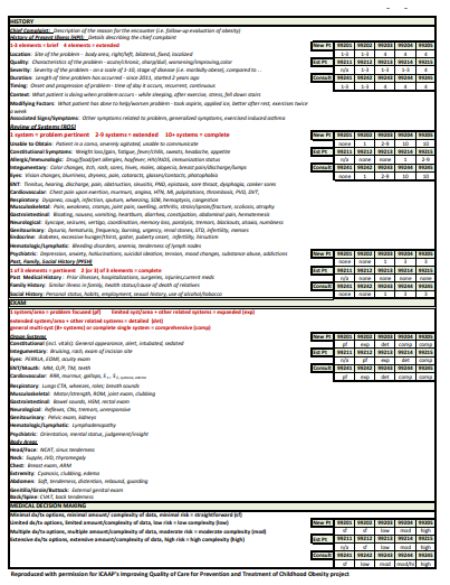
14-Point Review of Systems
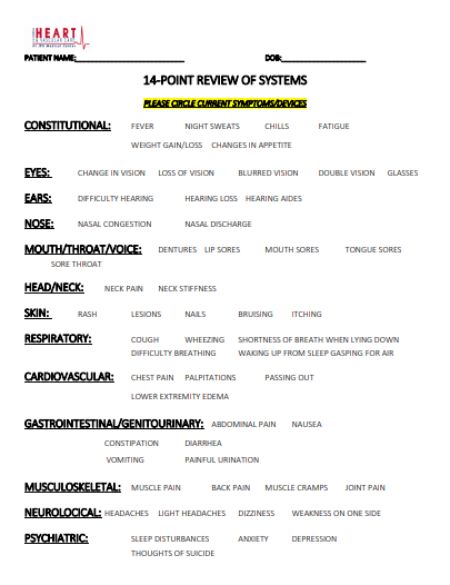
Definition: The 14-point review of systems is one amongst the numerous types of review of systems. It consists of an inventory of 14 body systems whose history is excerpted from a patient by the means of asking a series of questions. The 14-point review of systems applies the terminology of identifying any signs or symptoms which the patient may be experiencing currently or might have experienced in their past.
Number of Organ Systems Reviewed: The 14-point review of systems depends on 14 important organ systems to derive conclusive results regarding the person’s disease. However, it should always be kept in mind that the review of systems takes into account, the organ systems of the body and not the various regions of the body.
The organ systems which are reviewed under the 14-point Review of Systems are:
- Constitutional
- Eyes
- Ears, Nose, Throat, Mouth
- Respiratory
- Cardiovascular
- Gastrointestinal
- Musculoskeletal
- Integumentary
- Psychiatric
- Endocrine
- Neurological
- Hematologic
- Immunologic
- Genitourinary
Different Types of ROS
Based on the number of systems reviewed amongst the 14 points, there are four types of ROS that can be created. These are:
- None – In the None type, no systems are reviewed.
- Problem Pertinent – In the Problem Pertinent, there is only one organ system that is reviewed.
- Extended – In the Extended type of ROS, there are 2-9 organ systems reviewed.
- Complete – In the Complete type of ROS, more than 10 organ systems are reviewed.
Template:
An example of a typical 14-point review of systems is created according the template structure mentioned below:
Patient’s Name: ___________________________ Date of Birth: _________________
14-Point Review of Systems
Please Write Y[Yes] or N[No] next to the Symptoms That You May Have Been Experiencing
- Constitutional Organ Systems:
a. Fever …… b. Chills …… c. Night Sweats …… d. Fatigue ……
- Eyes:
a. Visual Changes …… b. Loss in Vision …… c. Blurred Vision ……
- Ears, Nose, Throat, Mouth:
a. Hearing Loss …… b. Nasal Congestion …… c. Mouth Sores …… d. Sore Throat ……
- Respiratory:
a. Cough …… b. Wheezing …… c. Difficulty Breathing ……
- Cardiovascular
a. Chest Pain …… b. Palpitations …… c. Cramping in Thighs …… d. Peripheral Edema …..
- Gastrointestinal
a. Abdominal Pain ….. b. Nausea …… c. Abdominal Pain …… d. Diarrhea ……
- Musculoskeletal
a. Muscle Pain …… b. Back Pain …… c. Joint Pain …… d. Restricted Motion …….
- Integumentary
a. Rashes …… b. Sores …… c. Blisters ……
- Psychiatric
a. Depression ……. b. Anxiety ……. c. Sleep Disturbances ……. d. Suicidal Thoughts ……
- Endocrine:
a. Heat Intolerance …… b. Cold Intolerance …… c. Excessive Thirst ……
- Neurological
a. Headaches …… b. Light Headaches ….. c. Dizziness …….
- Hematologic
a. Bleeding …… b. Abnormal Bleeding ……
- Immunologic
a. Allergic Reaction ….. b. Recurrent Infection ……
- Genitourinary
a. Painful Urination …… b. Frequent Urination …… c. Urgency ……
Checklist Review of Systems
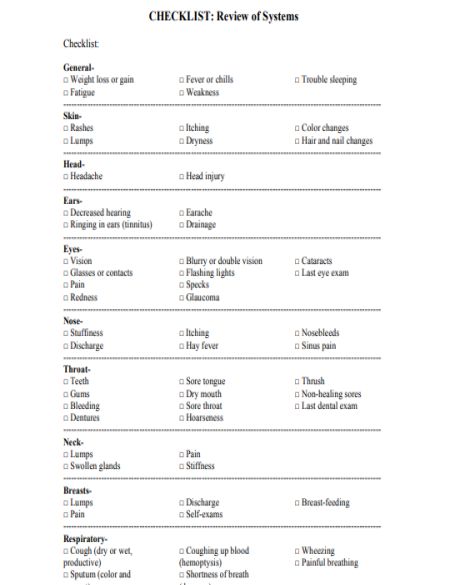
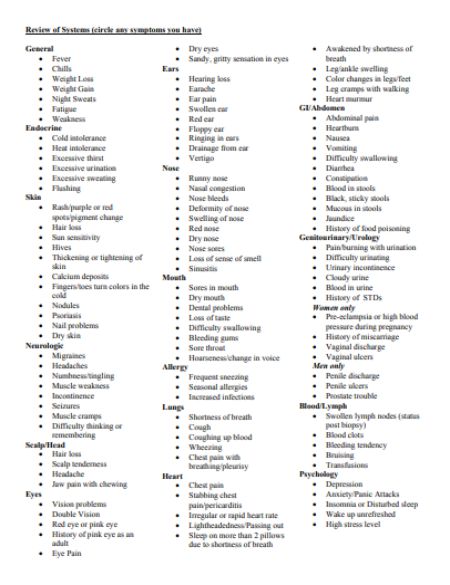
Definition: Similar to other review of systems, a checklist review of systems also relies on numerous questions being referenced from an inventory of body systems. The only difference between the checklist review of systems and the others is in the structure. Instead, of a patient encircling or writing Y or N beside the affliction, the checklist relies on the patient checking the box with the correct ailment.
Template:
An example of a typical checklist review of systems is created according the template structure mentioned below:
Date of Appointment: __________________
Patient’s Name: ___________________________ Date of Birth: _________________
Checklist Review of Systems
Please Check The Boxes for the Symptoms That You Might Have Been Experiencin
Checklist:
- Constitutional Organ Systems:
a. Fever ☐ b. Chills ☐ c. Night Sweats ☐ d. Fatigue ☐
- Eyes:
a. Visual Changes ☐ b. Loss in Vision ☐ c. Blurred Vision ☐
- Ears, Nose, Throat, Mouth:
a. Hearing Loss ☐ b. Nasal Congestion ☐ c. Mouth Sores ☐ d. Sore Throat ☐
- Respiratory:
a. Cough ☐ b. Wheezing ☐ c. Difficulty Breathing ☐
- Cardiovascular
a. Chest Pain ☐ b. Palpitations ☐ c. Cramping in Thighs ☐ d. Peripheral Edema ☐
- Gastrointestinal
a.Abdominal Pain ☐ b. Nausea ☐ c. Abdominal Pain ☐ d. Diarrhea ☐
- Musculoskeletal
a. Muscle Pain ☐ b. Back Pain ☐ c. Joint Pain ☐ d. Restricted Motion ☐
- Integumentary
a. Rashes ☐ b. Sores ☐ c. Blisters ☐
- Psychiatric
a. Depression ☐ b. Anxiety ☐ c. Sleep Disturbances ☐ d. Suicidal Thoughts ☐
- Endocrine:
a.Heat Intolerance ☐ b. Cold Intolerance ☐ c. Excessive Thirst ☐
- Neurological
a. Headaches ☐ b. Light Headaches ☐ c. Dizziness ☐
- Hematologic
a.Bleeding ☐ b. Abnormal Bleeding ☐
- Immunologic
a.Allergic Reaction ☐ b. Recurrent Infection ☐
- Genitourinary
a.Painful Urination ☐ b. Frequent Urination ☐ c. Urgency ☐
Examples: Apart from the example mentioned above, you can also develop a review of systems according to your needs. For example, a lot of healthcare providers develop their review of systems based on the disease inflicting a particular organ system.
For example, a heartcare treating a patient with cardiovascular diseases would include only cardiovascular systems. An example of this would be:
Date of Appointment: __________________
Patient’s Name: ___________________________ Date of Birth: _________________
Checklist Review of Systems
Please Check The Boxes for the Symptoms That You Might Have Been Experiencing
Cardiovascular Systems Checklist:
- Chest Pain ☐
- Palpitations ☐
- Shortness of breath ☐
- Peripheral Edema ☐
- Blood Clots ☐
- Varicose Veins ☐
- Cramping in thighs ☐
- Difficulty in breathing When you’re laying down ☐
- Sudden awakening due to shortness of breaths ☐
Another example of this could be a patient opting for a diabetic review of systems. The template for the same is given below:
Date of Appointment: __________________
Patient’s Name: ___________________________ Date of Birth: _________________
Checklist Review of Systems
Please Check The Boxes for the Symptoms That You Might Have Been Experiencing
- HYPOglycemia
a. Sweats ☐ b. Nausea ☐ c. Confusion ☐ d. Weakness ☐
- HYPERglycemia
a. Frequent Urination ☐ b. Unusual Thirst ☐ c. Blurred Vision ☐
- Are There Any Other Symptoms That You Might Be Experiencing?
a. Vision Problems ☐ b. Nausea/Vomiting ☐ c. Numbness ☐
d.Pain in your legs ☐ e. Ulcerations ☐ f. Near fainting ☐
g.Other (Please mention) _____________________________
Psychiatric Review of Systems
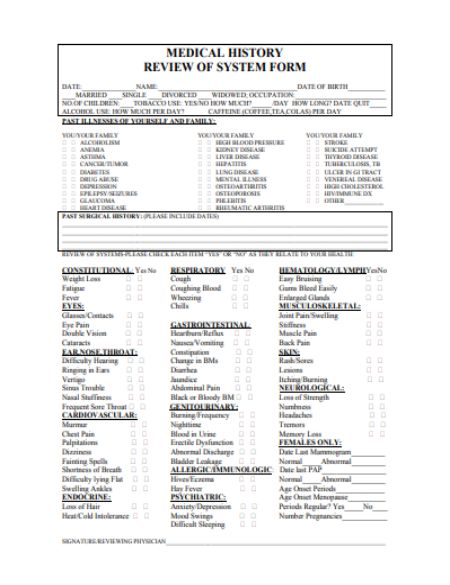
Definition: The Psychiatric Review of Systems is another useful screening tool which is employed quite frequently by psychiatrists to identify patients with psychiatric disorders. It follows a similar approach where patients are asked a series to determine their mental health. These questions are referenced from a variety of subjects relating to psychology. A few of these psychiatric disorders include:
- depression
- personality disorders
- substance abuse
- anxiety disorders
- eating disorders
- cognitive disorders
- psychotic disorders, and many more
Application Techniques: For each of the psychological disorders, the psychiatrist uses a common application technique. Following the suit, he or she uses the review of systems as a screening tool wherein each positive reply from the patients leads them to a detailed set of diagnostic questions. A few useful techniques which psychologists use from time-to-time are:
- gently moving on from one subject to another rather than changing the topic in a hushed manner
- giving out a feel of normalization wherein the patient is assured that any form of behavior is normal as well as understandable.
- symptom assumption wherein a question is phrased in a manner which implies that the patient has engaged in a particular activity or behavior
Applying such techniques while conducting a psychiatric review of systems allows the psychiatrist to receive accurate results in a rapid manner. Such results can be incorporated in the standard history of the patient to be used in accompaniment with any physical examination that might be conducted in the future.
The Important Systems: While performing the review of systems, it is important that psychiatrists go all the major organ systems starting from the head to the toe of the patient. Due to this, it is often difficult to remember abstract symptoms. Due to this, psychiatrists follow the mnemonic:- Depressed Patient Seems Anxious, So Claim Psychiatrists. The mnemonic can be expanded to:
- D: Depression and other mood disorders such as major depression, bipolar disorder, and dysthymia.
- P: Personality disorders such as borderline personality disorder.
- S: Substance abuse disorders
- A: Anxiety disorders such as panic disorders with agoraphobia
- S: Somatization disorders
- C: Cognitive disorders such as dementia
- P: Psychotic disorders such as schizophrenia, dementia etc.
Template:
An example of a typical psychiatric review of systems is created according the template structure mentioned below:
Date of Appointment: __________________
Patient’s Name: ___________________________ Date of Birth: _________________
Psychiatric Review of Systems
Please Check The Boxes for the Symptoms That You Might Have Been Experiencing
- Depression and other Mood Disorders
a. Sleep Disorder (decreased or increased sleep) ☐
b. Interest Deficit (anhedonia) ☐
c. Guilt (worthlessness, hopelessness, regret) ☐
e. Concentration Deficits ☐
f. Energy Deficits ☐
g. Appetite Disorders (decreased or increased disorder) ☐
h. Psychomotor retardation or agitation ☐
i. Suicidality ☐
- Personality Disorders
a.Identity Problems ☐
b. Disordered Affect ☐
c. Empty Feeling ☐
d. Suicidal Behavior ☐
e. Paranoia or Dissociative Symptoms ☐
f. Abandonment Terror ☐
g. Impulsivity ☐
h. Rage ☐
i. Relationship Instability ☐
- Substance Abuse Disorders
a. Opiates Abuse Disorders ☐
b. Simulant Dependency ☐
c. Depressants ☐
d. LSD ☐
e. Cannabis Addiction ☐
- Anxiety Disorders
a. Panic Disorders with Agoraphobia ☐
b. Obsessive-Compulsive Disorder ☐
- Somatization Disorders
a. Pain ☐
b. Neurologic Problems ☐
c. Gastrointestinal Complaints ☐
d. Sexual Symptoms ☐
- Cognitive Disorders
a. Dementia ☐
b. Delirium ☐
c. Amnesia ☐
- Psychotic Disorders
a. Major Depression ☐
b. Substence Abuse ☐
c. Dementia ☐
Nursing Review of Systems
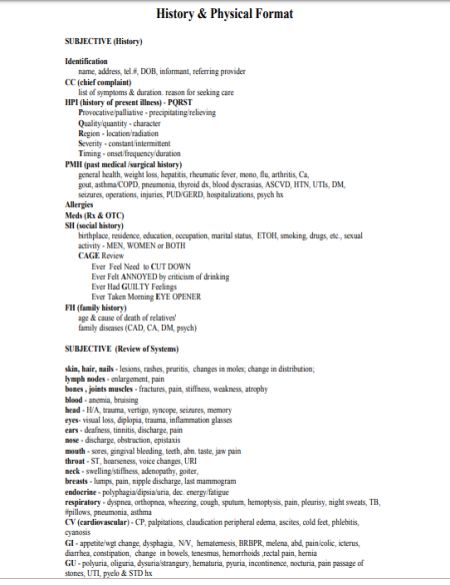
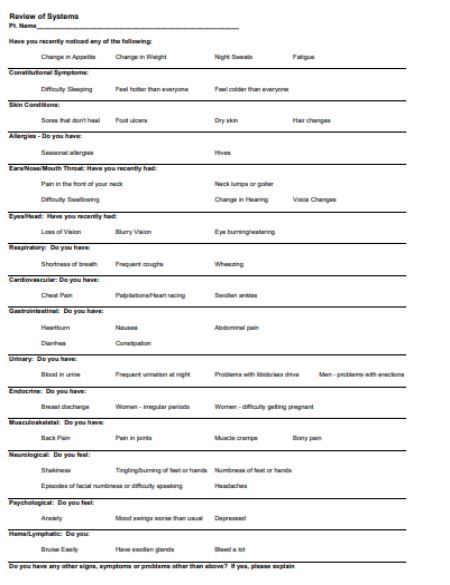
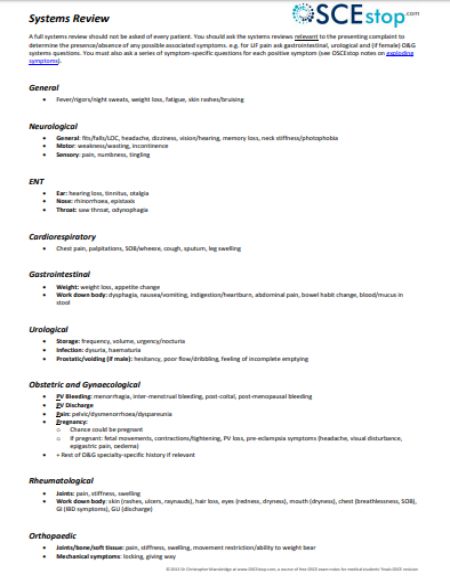
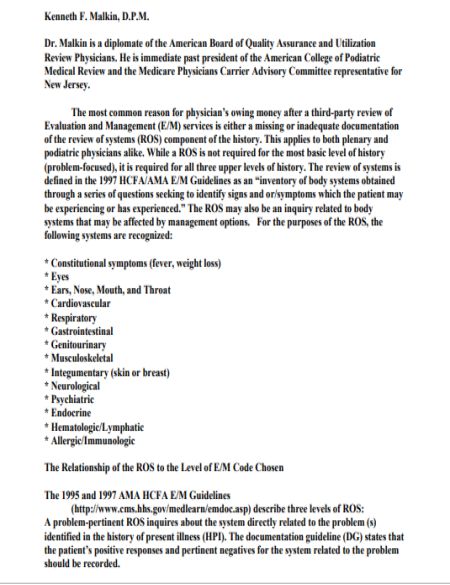
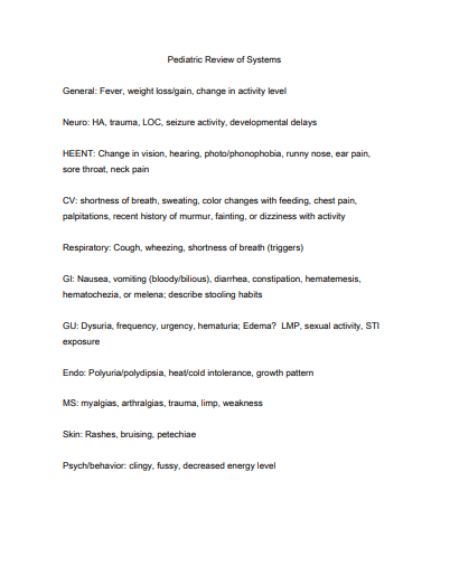
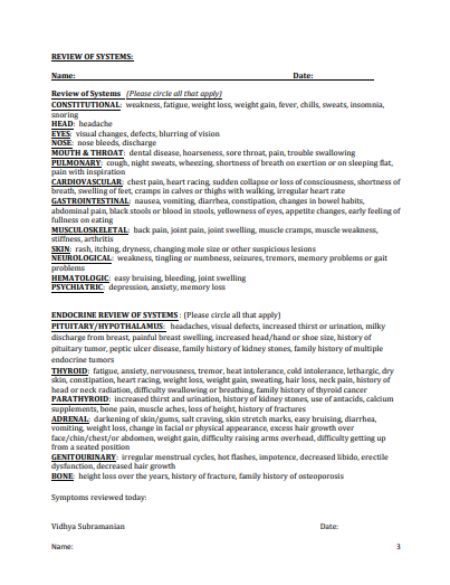
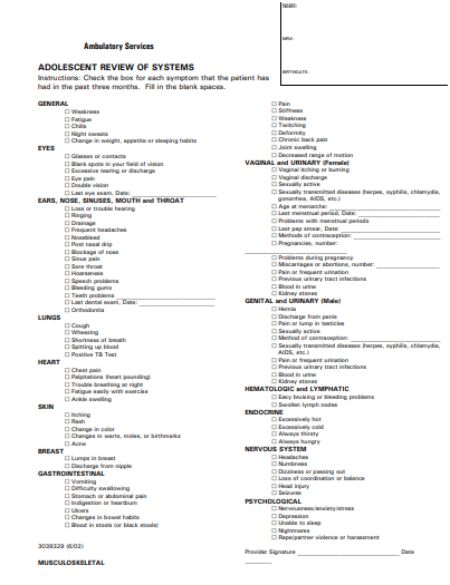
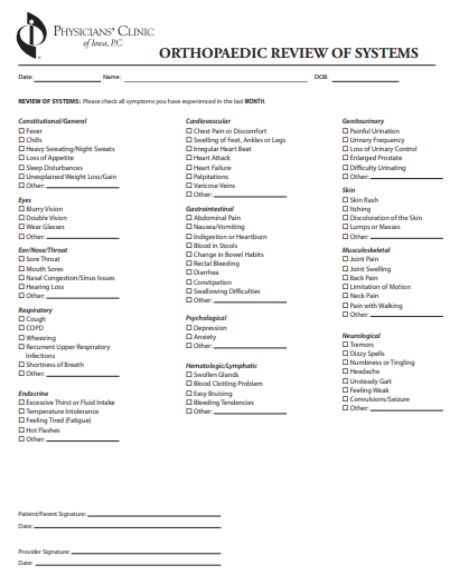
Definition: A nursing review of systems also functions by employing mannerisms in which a patient has to answer several questions which give the nurse a rough idea of the medical history of the patient. In such a review of systems, it is impertinent that the nurse remembers that an acute problem in one area of the body can also result in problems for other body systems. Due to this, they should always keep looking for correlations while performing the review of systems.
The Important Organ Systems: There are a few organ systems upon which the ROS focuses while promoting health for a particular system. These systems are:
- Abdomen
- Respiratory Systems
- Breast and Regional Lymphatics
- Female and Male Genitalia
- Head, Neck and other Regional Lymphatics
- Heart and Cardiovascular systems
- Musculoskeletal systems
- Neurological systems
- Nutritional Assessment
- Peripheral Vascular
- Rectum, anus and the prostate
- Skin, hair, and nails
- Spiritual and Wellness Assessment